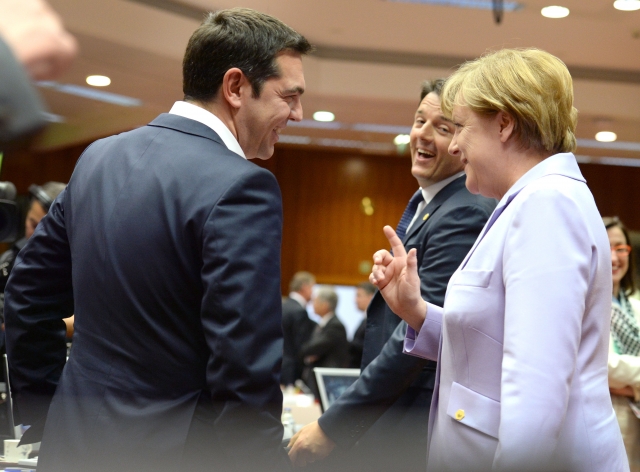The Greek crisis in full (maj)

(BRUXELLES2) These are not love letters. These are not tear letters. But it looks a bit like it. The letters, speeches, tweets that have been exchanged almost publicly in recent days between Europe and Greece show a certain lack of understanding on both sides, a lack of Europe.
Monday (June 22), Greece sends a letter setting out its counter-proposals. Download A summit meeting of Eurozone leaders doesn't really lead to anything other than asking the Eurogroup to keep working.
Thursday (June 25), the European authorities are developing a final plan “ taking into account the various Greek proposals".
Friday (June 26), overnight, Alexis Tsipras announces the holding of a referendum on the plan presented by the European Commission. François Hollande and Angela Merkel learn the news just before, that Greek leader has "elegantly" warned before. The Greek also called Jean-Claunde Juncker. But the President of the European Commission was sleeping soundly. And he won't learn the news the next day, like most other European leaders or finance ministers who discover the news on... twitter. What a pity.
Saturday (June 27), a new meeting of the Eurogroup ended, this time with a clear statement of disagreement. The Greek Finance Minister does not want to approve the final declaration. The Council's legal service is consulted. The Eurogroup is an informal structure. And there is no voting rule. The declaration is therefore adopted by 18 countries (except Greece). A footnote testifies to the divorce. The Greek minister leaves the room. The meeting continues at 18 pm to examine the stability measures to be taken in the Euro Zone. The word Grexit is no longer taboo. Download the Eurogroup statement
Sunday (June 28), the European Commission is releasing – which it had never done before – the document distributed to negotiators on the Greek debt. An interesting text because it contains the latest proposals agreed between the three institutions (European Commission, European Central Bank and International Monetary Fund). These proposals take into account the proposals of the Greek authorities of 8, 14, 22 and 25 June 2015 as well as negotiations at political and technical level throughout the week ». Download. Read also: In complete transparency… A defense budget, a little, preserved
Monday (June 29), during a press conference convened especially for the occasion, Jean-Claude Juncker, deliberately called for a 'Yes' vote in the referendum. Beyond the words, we feel in the former Prime Minister of Luxembourg a personal tear, a wound of self-esteem. Download (also read: Greece in the Euro. Farewell to Jean-Claude Juncker's youthful ideals)
Tuesday (June 30), Alexis Tsipras sends, at the last moment, in the afternoon a final letter to the president of the Eurogroup, the Dutchman Jeroen Dijsselbloem. Its content is rather vague and boils down to two demands: a new two-year assistance program and the restructuring of the Greek debt. A little exorbitant at first glance. In the aftermath, a meeting of Euro Zone Finance Ministers is convened by videoconference. The plan is finished, underline the ministers.
Wednesday (July 1), the International Monetary Fund (IMF) notes Greece's arrears in the sum of $1,5 billion. But he reserves the right to decide on the Greek request for an extension delay, request which will be examined by the Consulting of the IMF « on time " (Download IMF press release). Meeting twice during the day by videoconference, the Eurogroup decided to send back the Greek proposal. Jeroen Dijsselbloem's letter is a firm 'no thank you' and a 'return to sender' of the Tsipras proposal. Download.
On the same day, the Greek Finance Minister, Yannis Varoufakis, explained on his blog the 6 reasons that call him to vote 'No'
The referendum, held on July 5, ends with a plebiscite of the Tsipras government with 62% of "No" and a participation of nearly 2/3 of the Greeks. The polls which predicted a Yes and No side by side like the European institutions which had called for a "Yes" vote are disavowed (Read: Le Non Grec: Brussels has failed to conquer hearts and minds).
Le July 7, the ministers of the Euro Zone (Eurogroup) and the Heads of State and Government of the Eurozone respond to a new request for aid from the Tsipras government: reforms first, setting a deadline for the submission of this program : Thursday before midnight.
Thursday July 9, around 22 p.m., less than two hours before the deadline, the Tsipras government sent its proposal for a reform plan to the President of the Eurogroup, Jeroen Dijsselbloem. Download here. Proposal which receives a rather positive opinion from creditors (CEC, ECB, IMF). But the Eurogroup finance ministers are of a different opinion.
Sunday, July 12, at 15 p.m., the Eurogroup agrees on a set of measures and principles to be implemented. A very tough project which leaves in parentheses a few points to be discussed by the Heads of State and Government of the Euro Zone. Download here
Monday July 13, at 9 am, after a night and more than 17 hours of discussion, the Euro Zone summit reached conclusions that closely resembled the Eurogroup project, with a few (minor) exceptions. The trusteeship of Greece is confirmed. Download the conclusions in FR et ENG.
(Nicolas Gros-Verheyde)
(Updated July 13)
Read also:
- The world is burning, Europe is bickering
- Tusk whistles the end of recess in Tsipras
- "Don't pressure Greece". Washington brings Europe back to reality
- A little respect for Greece (Varoufakis)


